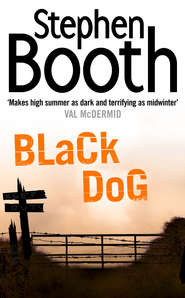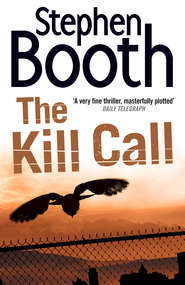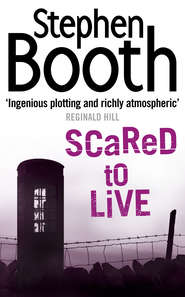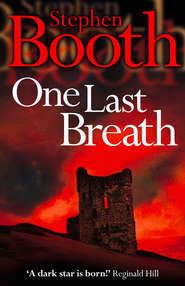По всем вопросам обращайтесь на: info@litportal.ru
(©) 2003-2024.
✖
Dancing With the Virgins
Автор
Год написания книги
2019
Настройки чтения
Размер шрифта
Высота строк
Поля
‘But I expect you might know people who do.’
‘I expect I might,’ said Matt.
‘There could be rumours about him. Farmers talk to each other, don’t they? Down at the mart.’
Matt’s face set into stubborn lines. ‘Are you asking me to find out things about this bloke Leach?’
‘Just … I wondered if you might hear anything, you know. If you did …’
‘Sorry, Ben.’
‘What?’
‘I mean, no, I won’t do it. I don’t much like being asked to be some sort of secret policeman. I don’t like being asked to be a policeman at all, come to that. You’re welcome to that job.’
Kate stood in the doorway. She frowned at Ben and shook her head, scenting an argument between the brothers. She said arguments upset the children. And she was right to be protective – there had been enough disruption in their young lives.
So Ben Cooper said nothing, just nursed his thoughts to himself. He and Matt had never talked about their father properly. Not ever, in the whole of their lives. And when he died, it was too late to start. Yet Cooper longed to know what his brother felt; he wanted to be able to tell him what his own feelings were, how much he had come to resent the memory of their father, and how much that resentment hurt because it was such a contradiction to the way he had viewed him when he was alive. He felt as though he was trampling a fallen idol.
But he suspected that their father still was an idol, of a kind, for Matt. And it was the police that Matt blamed for their father’s death.
Matt could have found out about Warren Leach, if he wanted to. He was right, of course – there were many farmers in trouble. There were farms left standing empty all around the Peak District now. At first, they had been snapped up by wealthy incomers, people who boasted of having ‘a country house with a big garden’, and thought it was a huge joke. Worst of all were the people who played at farming, filling a paddock with rare breeds of sheep, a Vietnamese pot-bellied pig, a donkey and a goat. They drove the real farmers to apoplexy.
And already buyers were getting choosier. Some of the older, more run-down farms that were coming on the market stayed unsold for many months. New owners could no longer rely on selling the land that went with them to provide the capital for work on the house. Neighbouring farmers didn’t want the land – they couldn’t afford it. And if it was difficult land, the high hill land, it was useless to them anyway. All they could keep on it were a few sheep, which themselves were worth next to nothing.
Cooper went upstairs and looked in at his mother’s bedroom. She was sleeping, and her face was peaceful. He could always tell from her face the state of her mind; the turmoil in her brain was reflected in the contortions of her expression, even in her sleep.
Satisfied, he got washed and changed and went back down to the kitchen. The girls, Amy and Josie, had joined their parents at the table, and the room was full of noise and life. Cooper waved goodbye and walked down the passage to the back door.
For a moment, he stood and looked at the farm. The outline of the buildings became clear as his eyes adjusted to the darkness. He could hear the cattle moving quietly, one of the dogs snuffling in the yard, a pheasant cackling, startled by some predator perhaps. Beyond the barn, the dark bulk of the hill came slowly into focus, its crown bare against the sky, but its middle faintly ragged, where the tree line followed the contours of the valley.
Most of the fields down here at Bridge End were good, rich land. They had inherited the farm from their maternal grandfather, who had died at some vast age, still tottering about the place in his ancient shiny black suit and his army boots, with baling twine tied round his trouser bottoms. Officially, the farm had passed to their mother, and still belonged to her. But Matt had been the one to run it, right from the beginning, when he was barely a year or two out of agricultural college and working as a cowman on a big tenanted farm at Rowsley.
Their father, Joe Cooper, had never been interested in the farm. He had been happy to let Matt take charge, though occasionally rolling up his sleeves on his off-duty days to help stack bales of hay or round up the sheep. Joe had been a big, powerful man. It ought to have been Ben Cooper’s abiding memory of him – tall and strong, with heavily muscled forearms and his huge hands wielding a pitchfork, his shirt open at his neck instead of buttoned up with a service tie at his throat, maybe laughing and at ease with his sons. But that wasn’t Ben’s lasting memory. Nothing like it.
Cooper wondered what the future of the farm would be. So many farmers were getting out – going bankrupt or just clearing out of the industry while they could. Pastures had been left to grow weeds and bracken encroached rapidly on to the higher fields, until some farms were like sores on the Peak. It was the farmers, after all, who had looked after the landscape of the national park. Within a generation or two, their absence would change the appearance of the countryside altogether.
A family that lost their farm would join the drift away from the Peak District into the soulless housing estates of the big cities, signing on to the list of unemployed in Sheffield or Manchester while their old homes were taken over by affluent city dwellers, their farmland converted into golf courses or pony trekking centres. To Ben Cooper, it was a neglected tragedy, a kind of surreptitious ethnic cleansing that would never trouble the United Nations.
He felt a familiar object bump his foot by the door. This strangely shaped lump of stone had stood by the back door of the farmhouse for decades, maybe for centuries. It was roughly rounded, with a broader base and a hollow in the middle, with a hole hacked through the bottom.
Everyone had used the stone as a boot scraper or a container for loose screws, until Cooper had seen a photograph in a local history book of an identical object. It was described in the caption as an Iron Age quern, used for grinding corn. It was two thousand years old.
The quern still stood by the back door of Bridge End Farm, unaltered from the last day it had been used for grinding corn. It had been emptied of screws and cleaned up. No boots were scraped on it now. The quern had always stood where it was, as far as anybody knew, so there was no suggestion of moving it. It was preserved for posterity. But nobody used it any more.
Before Cooper could get out of the house, Kate called to him from the passageway.
‘Ben, Helen Milner rang earlier this evening. She sounded a bit upset. She said you were supposed to be meeting her. I told her you were probably working.’
Cooper winced. Helen would have turned up at the rugby club looking for him – they’d had a date tonight. They’d been going out together for only two months. He knew all too well how she would interpret the way he had stood her up.
‘I meant to phone her, but I completely forgot.’
‘That’s what I thought,’ said Kate. ‘And Helen didn’t sound too surprised, either.’
There was no one waiting at home for Diane Fry when she pulled on to the drive at Grosvenor Avenue. The old house was converted into flats and bedsits, and her neighbours were mostly students that she rarely saw. They seem to spend most of their time in the pub.
Her room was cold, with a peculiar damp chill that seeped from the walls even in summer. She was already realizing what an uncomfortable, depressing experience a winter in Edendale was going to be. The three-bar electric fire barely chased the chill from the room. And it ate money from the meter at an alarming rate.
She wound down with a few stretching exercises, until her body tingled comfortably. She couldn’t remember when she had eaten last, and there was no food in the flat. But fasting was good for the body. It made her stomach feel tight and her brain active. She had found that eating meals caused her digestive system to drain her energy. Fry examined herself in the mirror. There was no injury to be seen on her own face. But it didn’t mean there was no scar. It meant only that it was the sort of scar that nobody else could see, that no one else could tell the way she was marked. That was how she was so much luckier than Maggie Crew. So lucky.
Like Maggie, unwilling to reveal her disfigurement to the gaze of a stranger, Fry knew the bitter taste of resentment against someone who knew your innermost secrets. She had felt like telling Maggie that she ought to get out and face people. But surely it was equally futile to try to avoid the person you resented.
‘What an idiot,’ she said, then mentally gave herself a reprimand for talking to herself. But she had meant it for Ben Cooper really, thinking of him buddying up so cosily with Todd Weenink. In the end, they were two of a kind. Besides, she thought, even Ben Cooper didn’t know all her secrets.
Fry drove into Sheffield, gradually relaxing as the vast sprawl of houses and factories closed around her, shielding her from the dark hills she was leaving behind in Derbyshire. She had first travelled into the city when she needed to find a martial arts centre away from Edendale, where the dojo used by Ben Cooper had become a no-go zone. Seeing the city streets then had reminded her exactly why she had come to this area.
She went straight into the centre of the city, circled the ring road and parked in a multi-storey car park near one of the main shopping streets, The Moor. Then she walked back towards the transport interchange at the bottom of the hill and waited for the carriages of a Supertram to pass before crossing the road.
The old railway arches at this end of the city would disappear when modernization reached them. But for now, they were home to a small group of people. No, not a group – they were a series of individuals. They lay in sleeping bags, under filthy blankets and cardboard boxes, huddled close together, yet still in their own completely separate worlds, not speaking to each other or acknowledging anyone else at all. They had isolated themselves for their own protection. Fry knew that the human mind was capable of shutting out many things when necessary, even the close proximity of other people.
The canal passed under the railway line here. There was a lock full of scum-covered water, waiting to lift boats another ten feet towards the hills around the city. The spaces under the arches had once been used for workshops and storage areas. For years now they had been boarded up, but the boards had been ripped off the doorways, exposing deep, dank caverns it would be foolish to enter.
Fry waited by the lock gate. After a few minutes, a figure stepped out of the shadows at the back of the arch and came towards her. It was a woman, a few years younger than herself. Her eyes looked simultaneously beaten and defiant.
‘I’ve not seen you around here before. What is it you want?’
Fry stared at her hard, but failed to see what she wanted to see. ‘I’m just looking,’ she said.
‘Are you after sex? Drugs?’
‘No.’
‘You must be the cops, then.’
‘I’m looking for this woman.’
Fry took the photograph from her wallet. It was old and worn, taken at least ten years ago. She knew it was futile hoping for an identification, but she had to keep trying. If you gave up trying, you gave up everything.
‘Never seen her before.’
‘You haven’t looked properly.’
‘Is she in trouble, then?’ The woman looked at the photo, and pulled a face, curling her lip and wrinkling her nose. ‘Nah. She’s too clean, for a start. And what sort of hairstyle is that, I ask you?’
‘She may not look like that any more,’ said Fry.
‘Eh?’ She laughed. ‘You’re wasting your time then, aren’t you, duck?’











